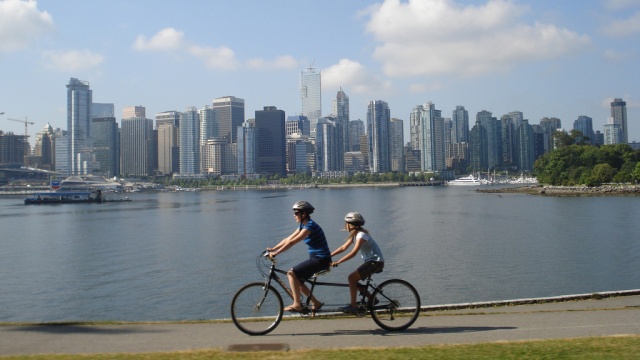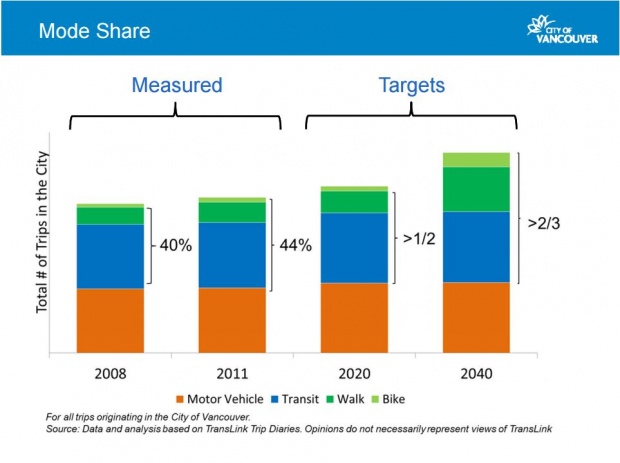
Much of my life’s work is based on the optimistic assumptions that people are basically intelligent and so will respond favorably to good planning and rational economic incentives such as smart growth and Transportation Demand Management (TDM). We now have some great success stories demonstrating the effectiveness of these policies. Halleluiah!
Recent travel data show that the City of Vancouver’s automobile mode share has declined to about half of all trips (most North American cities have about 80% automobile mode share), offset by growth in walking, cycling and public transit trips. Daily automobile trips declined from 980,000 in 2013 to just 918,000 in 2014, while walking, cycling, and public transit trips rose from 893,000 to 905,000. That puts the alternative modes in a statistical dead heat with automobile trips. The city has already surpassed its long-term target to reduce vehicle trips at least 20 percent by 2040.
Total motor vehicle travel declined 16.5 percent since 2007, and per capita reductions are even larger: average annual vehicle-kilometers per resident declined 26 percent, from 6,340 in 2004 to 4,680 in 2014, as illustrated in the following graph.
From our partners:
These travel impacts result from the city’s efforts to improve walking, cycling and public transit, plus its smart growth policies which create compact, multimodal neighborhoods. Most of the recent decline in automobile travel results from shifts to cycling, which doubled from approximately 50,000 daily trips in 2008 up to 100,000 in 2014, in response to the city’s substantial investment in high quality cycling facilities. The region has done little to increase public transit service on major corridors, resulting in crowding and delays, and flat transit ridership.
Low automobile travel rates provide significant benefits to urban residents. For example, the Vancouver region has 3.9 traffic deaths per 100,000 residents, one of the lowest among North American cities, and despite rapid growth in bicycle travel, crashes involving bicycles have not increased, indicating a declining crash rate.
Vancouver region households devote just 12.4 percent of their household budgets to transportation, the least of any North American city for which data are available, and 3.4 percentage points less than the average of other cities. This provides $2,623 average annual savings per household, totalling $1.7 billion annual savings for the region’s 633,460 households, which is greater than the region’s total public expenditures on walking, cycling, and public transit services. Those annual savings give an average household the ability to purchase $80,000 in additional housing value, which appreciates in value and so increases household’s long-term wealth compared with spend that same money on vehicles and fuel.
Vancouver also rates as one of the world’s most livable cities, indicating that many people value living in a city with a multimodal transportation system where residents have efficient alternatives to driving. Low motor vehicle travel rates can benefit everybody, including the people who rely on walking, cycling, and public transit, and motorists who benefit from reduced traffic and parking congestion, increased savings and reduced chauffeuring burdens.
This indicates significant latent demand for alternative modes by affluent households. Although few want to forego automobile travel altogether, many people would prefer to drive less and rely more on walking, cycling and public transit, provided those options are efficient, comfortable and affordable. Our job as planners is to respond to these changing demands.
This is timely information. Vancouver is just completing a plebiscite concerning whether to increase taxes to finance additional transportation improvements, including badly-needed expansion of public transit services. My analysis indicates that the additional taxes would be cost effective, their incremental costs are more than repaid by incremental savings and benefits, but the debate has been dominated by other issues. Unfortunately, we often fail to share this good news, as discussed in my previous column, Communicating Transit Benefits: We Can Do Better.
Some planning professionals continue to promote negative, and I believe outdated, ideas concerning the impacts and benefits of policy innovations. For example, in a recent blog, For Whom Transit? Professor David Levinson argues that public transit’s main role is to provide basic mobility for non-drivers, and should not be promoted as a way to reduce traffic congestion or provide other external benefits (benefits to people other than transit riders). Professor Levinson leads some terrific research concerning accessibility analysis, but tends to be skeptical of public transit and smart growth benefits. We now have good research indicating that high quality public transit, particularly grade-separated bus or rail integrated with transit-oriented development, often has substantial leverage effects on per capita vehicle travel (i.e., each transit passenger-mile reduces several automobile vehicle-miles), which provides substantial benefits, including reduced traffic and parking congestion, and other external benefits. I hope that new evidence, such as Vancouver’s success, can help overcome such excessive skepticism by professionals.
“Vancouver’s experience demonstrates that, with good planning, residents of economically successful cities will choose to drive less and rely more on alternative modes, and be far better off overall as a result.”
Well done Vancouver! Well done, Vancouver planners!
This feature is adopted from Planetizen and Todd Litman


















